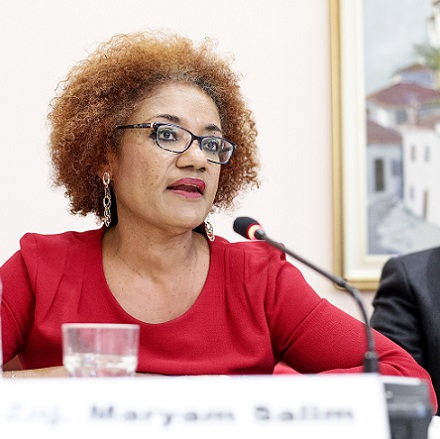Dear Mr. Sinaj, Mayor of Berat,
Ambassador Maître,
Deputy Governor of the Bank of Albania, Ms. Ahmetaj,
Distinguished citizens of Berat, visitors from neighboring countries, financial service providers, and colleagues,

On this occasion, the World Bank has just published an updated Brief on Migration and Development regarding global trends in migration and remittance flows. 2018 was a record year, with $528 billion in remittances, a global increase of 10.8 percent from last year. The Europe and Central Asia region leads this flow with a 20 percent increase, and Albania is among the ten top countries in the region.
Why are remittances so important for the receiving economies and their people? Sent by migrants to their families and friends at home, usually, these payments are the main source of household income, or for a specific purpose, for example, paying back a loan, housing improvements, managing health related costs, etc.
Many family budgets depend on remittances and they are vitally important to Albania. According to World Bank data, there are 1.2 million Albanians living abroad, which is more than 40 percent of the current population living within Albanian borders. The World Bank estimates that remittance inflows through regulated channels in 2018 will amount to $1.6 billion, representing 10.4 percent of GDP.
The Brief I mentioned also reports on progress on the global average cost of sending remittances. The data shows that this cost has remained nearly stagnant at 6.9 percent, more than double the Sustainable Development Goal (SDG 10.7) of 3 percent for promoting safe, orderly, and regular and responsible migration and mobility of people. The cost of sending remittances to Albania is high. The latest data (Q3 of 2018) shows that the average cost of sending $200 (or equivalent) to Albania is 8.4 percent of the amount (or, approx. $16.80).
So, for Albania, working towards remittance cost reduction is very important, as remittances constitute such an important part of incomes. This can be achieved by improving transparency, financial literacy, improving financial inclusion, and improving the safety and efficiency of the retail payment system.
The World Bank is helping through the Remittances and Payments Program (RPP), funded by the Swiss State Secretariat for Economic Affairs (SECO), and currently implemented in four countries in the Western Balkans (Albania, Bosnia and Herzegovina, Serbia, and Kosovo) and in Ukraine. This program aims at increasing the safety and efficiency of retail payments, with a specific focus on international remittances.
The RPP in Albania is designed to provide technical assistance to the authorities based on the recommendations and findings of an assessment that the World Bank carried out on the remittances market in Albania.
Today, we are commemorating International Migrant Day through “Project Greenback 2.0”, which is a framework developed by the World Bank to foster the development of a sound remittances market. This Project has been successfully implemented in a number of cities around the world: for example, Turin, Italy; Montreuil, France, and Johor Bahru, Malaysia. In addition to Albania, Project Greenback 2.0 is under implementation or under preparation in countries such as Haiti, Bosnia and Herzegovina, and Kosovo.
In Albania, this project was launched last March in Berat. Why Berat? Based on BoA data, Berat is the city with the second highest ratio of remittances received by the population, after Dibër. Berat is a recipient city with a heavy international remittance inflow and with the potential for moving away from cash-based payments and towards electronic instruments.
The project focuses on the demand side – the users of remittance services, promoting financial literacy and awareness campaigns locally; and also it interacts with remittance service providers, with the objective of encouraging demand-driven best practices. The project team is in constant communication with the relevant public authorities to report the findings of work in the field and to inspire possible reforms.
While the bulk of the activities will focus on the financial education of senders and recipients of remittances, this project also aims to expand the public discourse on the topic, by drawing special attention to the role that effective financial services and channels of delivery can play to enhance sustainable development overall. To this end, the World Bank is working to set up the Greenback Advisory Group, which brings together stakeholders and representatives from the public and private sectors.
We believe that our team, in cooperation with local authorities, the community and the financial service providers, will achieve the desired outcomes.
Thank you for your attention and for coming here today.


